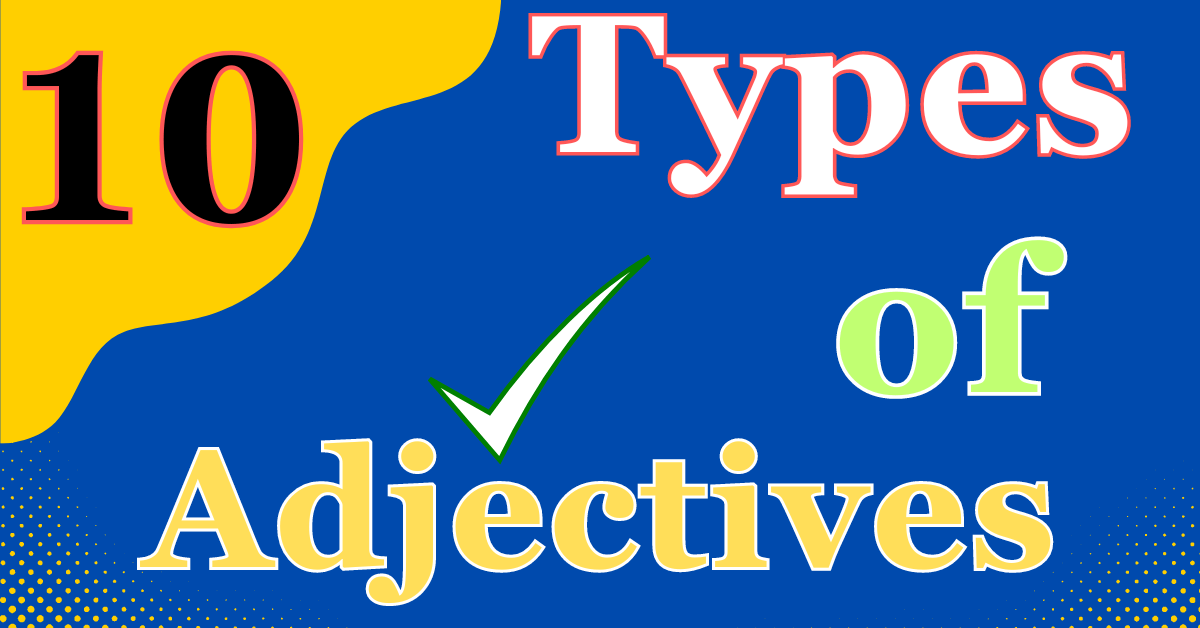An Adjective is a word that adds something to the meaning of a noun. It describes or modifies a noun or pronoun. It provides more information about the qualities, and quantities of a noun.
Adjective: Definition & Examples
Some Definitions of “Adjective” are as follows :
- “An adjective is a word used for qualifying or adding something to the meaning of a Noun or Pronoun.” – J. C. Nesfield
- “An adjective is a word used to add something to the meaning of a Noun.” – Wren & Martin
For example,
Good, Bad, Tall, Short, Beautiful, New, Old, Big, Small, black, blue, etc.
- Arjun is a good boy.
In this sentence, “good” is an Adjective. - He is old.
In this sentence, “old” is an Adjective. - This is a beautiful flower.
In this sentence, “beautiful” is an Adjective.
An adjective modifies a noun or a pronoun by describing, identifying, or qualifying words. An adjective usually precedes the noun or the pronoun that it modifies.
Adjectives : Classification
Adjectives are mainly of two types.
- Attributive Adjective
- Predicative Adjective
Attributive Adjective : Definition, Example
An adjective which precedes the noun it modifies is known as an Attributive adjective. An Attributive Adjective sits before a noun.
For example,
a lame man, a false statement, a white tiger, a beautiful flower, etc.
In the above examples, “lame” is an Attributive adjective modifying the noun “man“; “false” is an Attributive adjective modifying the noun “statement“; “white” is an Attributive adjective modifying the noun “tiger“, “beautiful” is an Attributive adjective modifying the noun “flower“.
Predicative Adjective or Predicate Adjective : Definition, Example
An adjective that is separated from the noun or pronoun by a verb is called a Predicative adjective. This predictive adjective comes after the noun or pronoun and it follows a linking verb such as am, is, are, was, were, etc.
- He is old.
In this sentence, “old” is a Predicative Adjective. “old” modifies the pronoun “he”. - I am sorry.
In this sentence, “sorry” is a Predicative Adjective. “sorry” modifies the pronoun “I”. - The flower is red.
In this sentence, “red” is a Predicative adjective. “red” modifies the noun “flower”. - Sourav is intelligent.
In this sentence, “intelligent” is a Predicative adjective. “intelligent” modifies the noun “Sourav”.
Both Attributive Adjective and Predicative Adjective qualify nouns. But only Predicative adjective qualifies a pronoun. Attributive adjective doesn’t qualify a pronoun.
Types of Adjectives
Adjectives can be classified into 10 types based on their function and nature. These are as follows :
- Adjective of Quality
- Adjective of Quantity
- Adjective of Number
- Proper Adjective
- Demonstrative Adjective
- Distributive Adjective
- Interrogative Adjective
- Possessive Adjective
- Emphasizing Adjective
- Exclamatory Adjective
Adjective of Quality : Definition, Examples
“Adjectives of quality” show the quality and kind of a person or thing. These adjectives are used to describe the nature of a noun or are used to express the shape, size, and color of a person, place, and thing. “Adjectives of quality” describe the characteristics or attributes of a noun, indicating its quality, condition, or state.
For example,
Good, bad, rich, poor, cold, hot, sweet, strong, new, etc.
- He is poor.
In this sentence, “poor” is an Adjective. - Rohit is a clever boy.
In this sentence, “clever” is an adjective.
Adjective of Quantity : Definition, Examples
“Adjectives of Quantity” are used to denote the quantity of nouns or pronouns. These adjectives help to show the amount or the approximate amount of the noun or pronoun. These adjectives do not provide exact numbers.
It is also known as Quantitative Adjective.
For example,
Some, all, any, enough, much, a little, sufficient, etc.
- He had many friends.
In this sentence, “many” is an Adjective. - Give me some food.
In this sentence, “some” is an Adjective. - I showed much patience.
In this sentence, “much” is an Adjective.
Adjective of Number : Definition, Examples
Adjective that shows the number of nouns or pronouns is called Adjective of number. These adjectives are used to show the number of nouns and their place in an order.
“Adjective of Number” is also known as “Numerical Adjective” or “Numeral Adjective“.
For example,
One, two, three, four, first, second, third, fourth, etc.
An adjective of number indicates the number of nouns or their position in a sequence.
Types of “Adjective of Number”
There are four types of Adjectives of Number.
- Cardinals
- Ordinals
- Multiplicative Adjective
- Indefinite Adjective
Cardinals
Cardinals are Adjectives that indicate exact numbers of nouns. Cardinal numbers are necessary for counting and measuring specific quantities.
For examples,
One, two, three, four, five, six, seven, eight, nine, ten, etc.
- I have five books.
In this sentence, “five” is a Cardinal number.
Ordinals
Ordinals are Adjectives that indicate the position of nouns in an order.
For examples,
First, second, third, fourth, fifth, sixth, seventh, eighth, ninth, tenth, etc.
Multiplicative Adjective
Multiplicative Adjectives indicate how many times something is multiplied.
For example,
Single, double, triple, etc. are examples of Multiplicative adjectives.
Indefinite Adjective
An indefinite adjective modifies a noun, pronoun, or noun phrase. It does not provide any particular amount or number, it provides a general sense.
For example,
Many, a few, most, several, etc.
Many boys, a few birds, several books, etc.
- Many people believe this.
In this sentence, “many” is an Indefinite adjective.
Proper Adjective : Definition, Examples
Adjectives that are formed from proper nouns are called Proper Adjectives. Proper Adjectives are the adjective form of proper nouns.
Proper adjectives begin with a Capital letter in English.
For example,
Indian, Chinese, French, African, etc. are Proper Adjectives.
“India” is a Proper Noun but “Indian” is a Proper Adjective.
- I have many German friends.
In this sentence, “German” is a Proper adjective. - He is an Indian boy.
In this sentence, “Indian” is a Proper adjective. - The Indian team won the match.
In this sentence, “Indian” is a Proper adjective.
Demonstrative Adjective : Definition, Examples
Demonstrative adjectives are adjectives that are used to point out or indicate a particular noun or pronoun.
For example,
This, that, these, those, etc.
- These mangoes are sweet.
In this sentence, “these” is a Demonstrative Adjective. - This boy is stronger than that boy.
In this sentence, “this” and “that” are Demonstrative Adjectives. - This girl is more intelligent than Smriti.
In this sentence, “this” is a Demonstrative Adjective that indicates the noun “girl” specifically.
The demonstrative adjectives are identical to the demonstrative pronouns. These are used to modify nouns or noun phrases.
Distributive Adjective : Definition, Examples
Distributive adjectives are used to refer to members of a group as individuals. These Adjectives are placed before a singular noun or a pronoun.
For example,
Each, every, either, and neither, etc.
- Each boy will get a prize.
In this sentence, “each” is a Distributive Adjective. - He took neither side.
In this sentence, “neither” is a Distributive Adjective. - You may take either side.
In this sentence, “either” is a Distributive Adjective. - There are trees on either side of the road.
In this sentence, “either” is a Distributive Adjective.
Interrogative Adjective : Definition, Examples
When Interrogative Pronouns are followed by a noun, then they are said to be Interrogative Adjectives. These adjectives are used to ask questions about nouns. An interrogative adjective is like an interrogative pronoun. These are used with nouns to introduce a question.
For example,
What, which, whose, etc.
- Which book did you read last night ?
In this sentence, “which” is an Interrogative adjective that is used before the noun “book” to make an Interrogative sentence. - Whose book is this?
In this sentence, “whose” is an Interrogative adjective that is used before the noun “book” to make an Interrogative sentence. - What news did she bring?
In this sentence, “what” is an Interrogative adjective that is used before the noun “news” to make an Interrogative sentence. - Which shirt is yours?
In this sentence, “which” is an Interrogative adjective that is used before the noun “shirt” to make an Interrogative sentence. - Which pen do you want ?
In this sentence, “which” is an Interrogative adjective used before the noun “pen” to make an Interrogative sentence.
Possessive Adjective : Definition, Examples
An adjective that is used before a noun and modifies the noun to show the possession to a particular person or thing is called a possessive adjective. A Possessive adjective modifies a noun or a noun phrase.
For example,
my, his, her, your, its, our, their, etc.
- This is my book.
In this sentence, “my” is a Possessive adjective indicating possession. The possessive Adjective “my” modifies “book”. - This is our house.
In this sentence, “our” is a Possessive adjective indicating possession. The possessive Adjective “our” modifies “house”. - That is their pond.
In this sentence, “their” is a Possessive adjective indicating possession. The possessive Adjective “their” modifies “house”.
Emphasizing Adjective : Definition, Examples
An adjective that is used to emphasize a noun is called Emphasizing Adjective. Emphasizing adjectives are used to emphasize the nouns.
For example,
very, own are used as Emphasizing Adjectives.
In the following sentences, “Emphasizing Adjectives” are italicized.
- Mind your own business.
- Oil your own machine.
- I want the very book.
- I saw it with my own eyes.
- I made it with my own hands.
Exclamatory Adjective : Definition, Examples
- What an idea !
- What a beauty !
- What a fall !
- What a beautiful painting !
In the above sentences, ‘what’ is used as exclamatory adjective.
Adjectives Examples in Sentences
In the following sentences, Adjectives are italicized :
- The flower is red.
- He is old.
- The boy is intelligent.
- These mangoes are sweet.
- Each boy will get a prize.
- Whose book is this?
- Which pen do you want?
- Whose pen is this?
- What kind of man are you ?
- This is my book.
- She was beaten at her own game.
- Her hair is black.
FAQs
What is the meaning of Adjective in Hindi ?
The meaning of Adjective in Hindi is विशेषण.
Is adjective a part of speech ?
Yes. Adjective is a part of speech. There are 8 Parts of Speech. 8 Parts of Speech are : Noun, pronoun, adjective, verb, adverb, preposition, conjunction and interjection.
What are 10 examples of adjective words?
10 examples of Adjective words are as follows :
Good, bad, new, old, cold, hot, young, strong, beautiful, happy.

